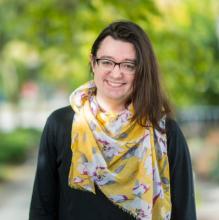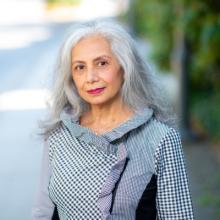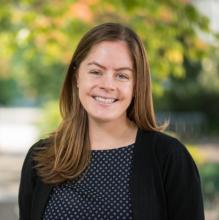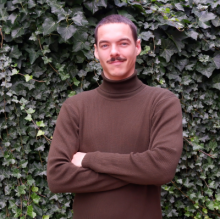Being a Public Scholar is a public commitment to use my skills and privileges to work for social change and produce action-oriented research. Personally, I feel a resounding sense of urgency and responsibility to respond to climate change and other global environmental problems and resist the ongoing harms of colonialism, patriarchy, and all manners of oppression.
Research Description
There is an urgent need for more just and sustainable ways of producing, distributing, and selling food, especially given intensifying food insecurity and escalating impacts of climate change. Novel technologies that promise quick and revolutionary interventions for food systems are alluring for elected leaders, policymakers, and other governance actors. However, research on past socio-technical transitions in capitalist and colonial contexts demonstrates that the risks and benefits associated with technologies are inequitably distributed across geographic space and lines of social difference. My research takes up arguments from social movements and academics that new technologies can be used to advance food sovereignty and disrupt unsustainable systems, although it requires intentional technological development and governance. My interdisciplinary social science dissertation critically examines technological change in food systems and analyzes the conditions under which novel technologies and big data can support transitions to more sustainable, just, and secure food systems in Canada. For my PhD, I am investigating the implications of digital technologies on farms (e.g., farm management platforms) and gene-editing in plant breeding (e.g., CRISPR-Cas9) in a series of research projects grounded in quantitative and qualitative survey data, semi-structured interviews, and focus groups.
What does being a Public Scholar mean to you?
To me, being a UBC Public Scholar is a public commitment to use my skills and privileges to work for social change and produce action-oriented research. Personally, I feel a resounding sense of urgency and responsibility to respond to climate change and other global environmental problems and resist the ongoing harms of colonialism, patriarchy, and all manners of oppression. Sometimes the grief and anxiety associated with paying attention to the world is overwhelming; other times, it is a useful motivator and compass for me. When I chose to pursue a PhD, I felt that there was (and is) too much at stake in the world to only pursue knowledge for its own sake (I do still believe in an inherent value of knowledge). I have admired the PSI and its Scholars since arriving at UBC. These folks are leading by example and offered inspiration at formative stages of my degree. I have so much to learn from the Public Scholars Network; I am honoured to be included in this community.
In what ways do you think the PhD experience can be re-imagined with the Public Scholars Initiative?
By design, public scholarship responds to community needs, offers practical findings and resources to the groups the research engages (research participants and the communities they represent, research partners, etc.), and intentionally produces knowledge and benefits that extend beyond academia. These actions go beyond requirements of completing a PhD. The PSI offers a community of support and resources to facilitate the integration of public scholarship in academic training and PhD theses. The public scholarship I am pursuing requires the development of new skills and work outside of the academic conventions in my fields of study (sociology, geography, environmental studies). For example, my work with farming organizations and civil society addresses the question: How can digital agriculture applications govern their data and knowledge in a way that prioritizes data justice and sovereignty for farmers and farm workers at the individual and collective level? Although this question is academically interesting, I am working to serve my research partners and the communities they represent by producing non-academic deliverables, such as community workshops on data justice for farmers and policymakers, co-designing a data governance policy, working with farmer-led technology and movements, and reporting to the findings to the United Nations Food and Agriculture Organization’s Improving Global Agriculture Data (IGAD) community of practice. As a UBC Public Scholar, I have the support to ensure that I can do this research well and build the skills to continue public scholarship moving forward.
How do you envision connecting your PhD work with broader career possibilities?
My professional goals are to advance interdisciplinary food systems research, mobilize applicable knowledge for policy and civil society, and act as an educator and mentor for future scholars and leaders. There are several career paths within and beyond academia that would allow me to achieve these objectives. The PhD is not merely a means to an end for my career. It affords me time, resources, and freedom to cultivate a diverse professional network, further my research training, conduct research that I care about, and practice public scholarship. The PhD experience, enhanced by the support of the PSI, offers many transferable skills and invaluable relationships. After the PhD, I will maintain the relationships that I build during my degree to work alongside researchers, farmers, activists, practitioners, and a diversity of people working for more equitable and sustainable food systems in Canada.
How does your research engage with the larger community and social partners?
I am fortunate to have the opportunity to work with a diversity of social partners and groups that bridge academic research with governments, civil society, and community movements. For example, LiteFarm – a free, open source, and open-access farm management platform – is a research partner and serves as a case study for my dissertation. Co-developed by researchers and farmers, LiteFarm is the fruit of an ongoing citizen-science approach to technology development and part of a multi-year international participatory action research project at UBC’s Centre for Sustainable Food Systems. As part of my public scholarship, I am embedded in the LiteFarm team (which includes interdisciplinary researchers, software developers, engineers, farmer liaisons, etc.) and advise on the platform’s policies and design decisions regarding data collection, handling, and governance. Through this work, I will also engage with the larger community of farmers using the platform in 115 countries. Other groups and organizations that have informed my research design and act as partners in my public scholarship projects include: the United Nations Food and Agriculture Organization’s Improving Global Agriculture Data (IGAD) community of practice; Open Technology Ecosystem for Agricultural Management (OpenTEAM); and the British Columbia Agricultural Climate Adaptation Research Network (BC ARCAN).
Why did you decide to pursue a graduate degree?
I am a curious person who loves to learn, and I believe in the power of academic research and public scholarship to drive meaningful change. I was raised in a family that valued life-long learning and education. My grandfather would say: « Le savoir est la plus grande richesse que tu puisses acquérir. Avec cette richesse tu vivras une vie remplie de défis et de bonheur. Donnes-toi de tout cœur et tu ne le regretteras jamais » [translated: “Knowledge is the greatest wealth you can acquire. With this wealth, you will live a life filled with challenges and happiness. Give yourself wholeheartedly; you will never regret it”]. From an early age, I benefitted from excellent teachers and mentors who challenged me and modelled how to think critically and grapple with big questions. I was encouraged to pursue research opportunities during my undergraduate at Queen’s University, which sparked a passion for research. Then, I had great peer and supervisor support during my masters at the University of Waterloo, which provided the confidence to apply for my PhD to expand on my thesis work (I didn’t feel like my work was finished; I had even more questions than when I started!). But, most importantly, I am pursuing my doctorate because I see value in academic research as part of my broader theory of change. I am inspired by academics who leverage their knowledge and resources to contribute to the public good.
Why did you choose to come to British Columbia and study at UBC?
UBC’s Institute for Resources, Environment and Sustainability (IRES) is an ideal research environment for interdisciplinary academic training for research that aims to address grand social and environmental challenges. I chose to pursue my PhD at UBC IRES because the department is internationally renowned in my field, supports interdisciplinary research and public scholarship, and offers the opportunity to work closely with leading experts – namely, my co-supervisors Professors Hannah Wittman and Terre Satterfield. When I was applying, students in the program also spoke enticingly about the department’s collaborative ethos and camaraderie among peers, as well as supportive admin staff (which has absolutely been my experience here). It is a perfect fit for me. On a personal note, I’ve always felt drawn to the mountains and oceans. Studying at UBC in Vancouver was an irresistible opportunity to spend time in a dynamic city surrounded by beautiful lands and waters to learn about and enjoy responsibly. I am deeply grateful to live, work, play, and eat on the traditional, ancestral, and unceded territories of the Coast Salish peoples—the Sḵwx̱wú7mesh (Squamish), Stó:lō and Səl̓ílwətaʔ/Selilwitulh (Tsleil-Waututh), and xʷməθkʷəy̓əm (Musqueam) Nations.




